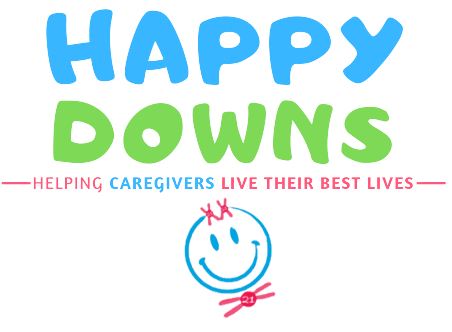This post contains affiliate links. This means that if you click on a link in this post, we may be compensated, at no extra cost to you. Please see our Terms of Use & Privacy Policy for full details.
I think we need to have a frank conversation when it comes to caregivers and money. As a caregiver, did you honestly sit down and pencil out your finances and how they would be impacted by you becoming a lifelong caregiver? Parents, have you actually taken the time to think about the financial impact of having a child with Down Syndrome? Siblings and other family members, did you seriously think through the financial impact of caregiving?
If you are like me, then chances are you did not. You were just so focused on the fact that you love your family member and they needed proper care, weren’t you? I did not truly grasp the gravity of my financial situation until I found myself in serious debt and then I had my “Come-to-Jesus” moment.
One of my uncles would always say “It takes cash to care”, which is basically saying the same thing as “Love can’t put food on the table”, all of which means that loving and caring for your family is not enough, you have to provide financially as well. When I realized that my truth and my reality was that my job was unable to financially cover myself and my sister, I then had to seriously look into ways of changing the course that we were on.
The Financial Impact of Caregiving
Did you know that many family caregivers end up leaving the workforce earlier than they had planned in order to provide full-time care for their loved one? Did you know that this unexpected early departure from the workforce often leads to poverty for these caregivers?
Did you know that caregivers end up losing their businesses and homes because they had to make the decision to use the money that was allocated for the business or the home to provide care for their loved one?
Did you know that the small things that we do for our loved ones add up? We often focus on the big things like providing utilities, shelter, healthcare and food; but did you know that the little things that we do to make our loved ones comfortable, e.g., bringing them to the movies and buying their favorite items at the supermarket, add up over time and take our wallets by surprise?
Time to Face the Music
Caregivers, we all need to come to the conclusion that finances must be discussed. Parents, please discuss your actual financial status with your children/family members, especially the one(s) you expect to take over as caregiver for your child with Down Syndrome.
Have at least one child/family member on your bank accounts. A word of advice though, to avoid friction amongst your children, speak with all of them, even though there may be one child that will take the reins. Encourage that child that will be in charge to continuously keep their siblings informed and up-to-date, as you never know what can happen in the future.
On the topic of whether your family member with Down Syndrome should be placed in a home, please do not totally forbid this idea. Why? Well there have been times when a person may become so ill that the doctor themselves tell the family that they cannot bring their family member home and that they must put the family member in a home in order for them to receive the care their need.
When you impress upon the family that a home can never be an option and something like this happens, your family is then racked with guilt for having to make such a decision. My suggestion is that whilst everyone is still fairly healthy, you all research and visit these types of homes and select a suitable one as a back up plan. This point goes for parents as well, who tell their children to never put them in a home…have a back up plan for yourself.
Another thing that families can do is to research the resources that may be available to them, depending on where they live. Contact your local government office or ministry (or whatever exists in your neck of the woods) that could guide you as to the resources that are available to family caregivers or persons with disabilities. Check out you local Down Syndrome Foundation or disability organization and see if they too can help.
The Writing on the Wall
I think certain things have become very clear to us as caregivers:
- the money we make from our job will have to take care of us in our old age or if we become ill AND take care of our loved one who has Down Syndrome for the rest of their life.
- the job we have now cannot cover our family’s care…present and future.
- we need a plan to ensure that we are all taken care of, now and in the future.
Possible Solution
Maybe your best bet as a caregiver is to make money doing something that is location independent and where you set your own hours. This way you do not have to worry about losing your job due to absenteeism, nor do you have to worry about your family member being alone at home.
Maybe you should consider working from home. Whilst still employed to your “9 to 5”, you can start:
- building your freelance career, or
- building your online business.
Being a freelancer means that instead of working on a salary basis for one employer, you provide your service as a writer, designer, teacher, software developer, digital marketer, etc. to various clients and you can do this online, from the comfort of your home.
Check out websites like Upwork, Fiverr and The Hive to sign up to be a freelancer. After you’ve gained some freelance experience on these websites, you can always create your own website and offer your services there.
If your interest is building a business online, then I suggest you look into making money from blogging or creating an e-commerce store. With blogging, you really make most of your money two ways: affiliate marketing and selling your own digital products. I recommend Wealthy Affiliate if you want to learn to create a successful blog and I suggest you follow Kirk Buchanan on YouTube to learn about e-commerce.
It Takes Cash to Care
My uncle was right. When it comes down to it, we need to be in good financial standing in order to provide proper care for ourselves and our families. Financial stress is no joke and not being able to care for yourself or your loved one, because you are short on cash ,can adversely affect your mental health.
So let’s be proactive. Let’s start now to change the course that we are on, to one that puts us in a position where we actually have the cash required to care.
All the best caregivers! As you start this journey, you will not figure everything out overnight. Just take it one day at a time, put in the work, stick to it and you will reap the rewards.
We at HappyDowns are rooting for you! Feel free to share with the community whatever services you provide or any businesses that you have, so that other caregivers can support you.
Hugs!

